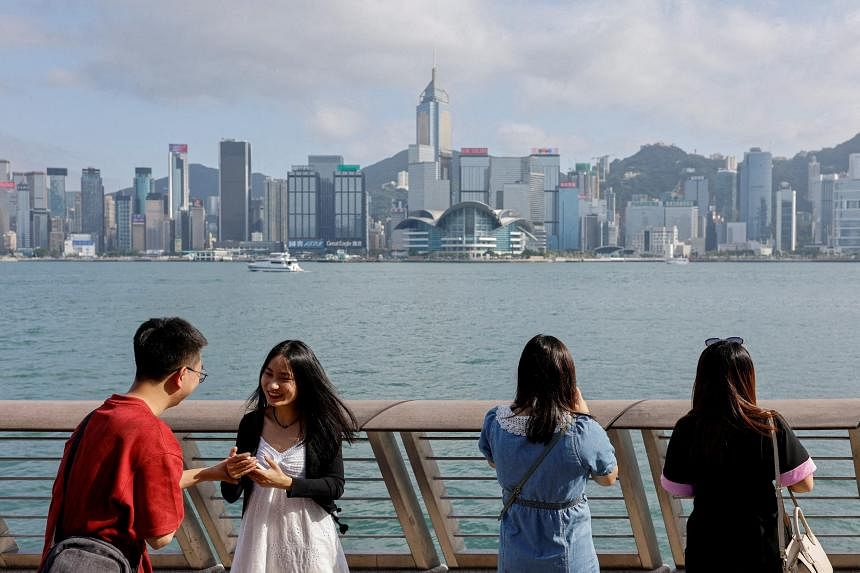HONG KONG – Hong Kong has pulled out all the stops to welcome at least 800,000 mainland visitors during China’s five-day Labour Day holiday, but stormy weather and a weak yuan threaten to throw a spanner in the works.
Thunderstorms and occasional showers have been forecast throughout the Golden Week national holiday from May 1 to 5, with some sunny intervals only in the final three days, according to the Hong Kong Observatory.
The poor weather could result in a major fireworks display across Victoria Harbour on the evening of May 1 being called off, the city’s tourism chief Kevin Yeung said on April 28.
The 10-minute marine pyrotechnic display is meant to be the first of a series of regular fireworks shows put up to boost tourism in the city.
Some restaurateurs are concerned that the rainy weather would affect business during the crucial holiday period, local broadcaster TVB reported.
“We’re situated at a great place to catch the fireworks – it’s al fresco,” said Mr Lau Ching Fung, the manager of a restaurant serving Western cuisine at the Wan Chai waterfront area. “But because most of our seats are outdoors, it will affect us significantly if it rains.”
The restaurant has a HK$560 (S$97) per person “fireworks dinner set” promotion for the May 1 holiday, but only 30 per cent of seats had been reserved so far, he said.
Hong Kong Federation of Restaurants and Related Trades president Simon Wong said the food and beverage sector could lose as much as 40 per cent of its holiday business due to the unstable weather.
Some retailers are also worried that the weakening Chinese currency could inhibit mainland tourists’ spending.
Since the start of the year, the yuan has fallen 2 per cent against the US dollar – to which Hong Kong’s currency is pegged – slumping to a five-month low. The weaker yuan means that Hong Kong’s goods are now comparatively costlier for mainland tourists.
These potential downers come after the authorities have gone the whole hog to prepare the city for an influx of tourists during the holiday period.
The Hong Kong government has predicted that more than 800,000 mainland tourists will visit and some 5.9 million people – mainlanders, Hong Kongers and foreigners – will cross the border checkpoints both ways throughout the holiday.
With these expectations in mind, the authorities have extended the operating hours of public transport systems across the city. They have ramped up cross-border bus services by 40 per cent and added 540 train trips along seven rail lines on three days during the Golden Week.
Major tourist attractions, including Disneyland, Ocean Park and the Palace Museum, are staying open for longer to cope with more visitors. Police officers have been deployed to combat illegal taxis and touting near tourist hot spots.
In Kowloon, a special shopping festival is offering discounts at more than 2,000 businesses in malls, hotels and restaurants along Tsim Sha Tsui and Mong Kok.
On Hong Kong Island, popular Taiwanese band Mayday is set to play seven shows to a combined audience of 140,000 people at the Central Harbourfront from April 30.
Months earlier, the Hong Kong government struck up partnerships with mainland influencers and travel firms to promote the city as an attractive tourism destination across the mainland.
Some 16,000 Hong Kong tourism vouchers worth a combined HK$3.2 million were distributed to residents in the Chinese cities of Xi’an in Shaanxi province and Qingdao in Shandong province.
The Chinese government in March added these two cities to a travel scheme of 49 other mainland cities – including Beijing, Shanghai and Chengdu – whose residents can visit Hong Kong on individual visas.
Tourism is a key pillar of Hong Kong’s economy, which has taken a beating since the Covid-19 pandemic. Mainland tourists have returned to the city more rapidly than those from other parts of the world.
In the last quarter of 2023, the number of mainland tourists had recovered to 80 per cent of the average in the five-year period between 2015 and 2019, compared with just 60 per cent of international visitors in the same period, according to the Hong Kong Tourism Board.
If the 800,000 mainland tourists materialise as predicted, the figure would be 30 per cent more than those who visited in the same period in 2023, the tourism board said.
The Travel Industry Council executive director Fanny Yeung told TVB that mainland tourism across Asia has improved, with mainland Chinese now able to visit destinations such as Singapore, Malaysia and Thailand visa-free since early 2024.
“Many mainland tourists, especially those from the Greater Bay Area, choose to visit Hong Kong first and tour the city for a day before travelling on to other destinations around South-east Asia,” she said. “In this aspect, Hong Kong has stood to benefit.”


